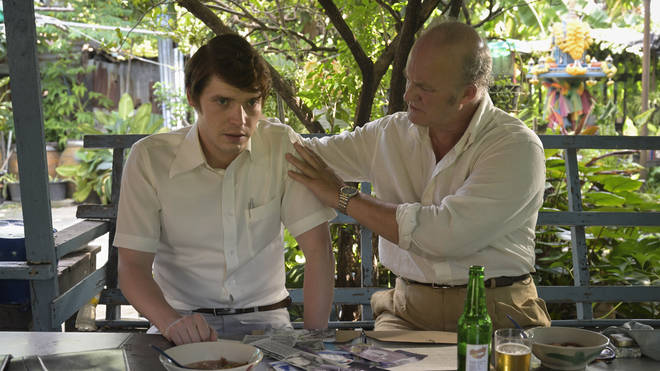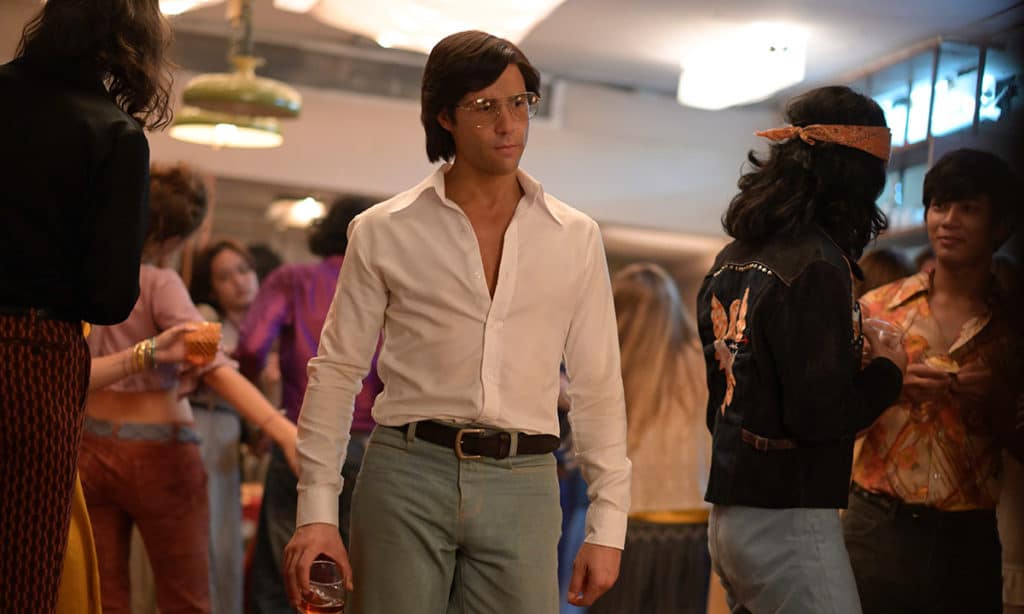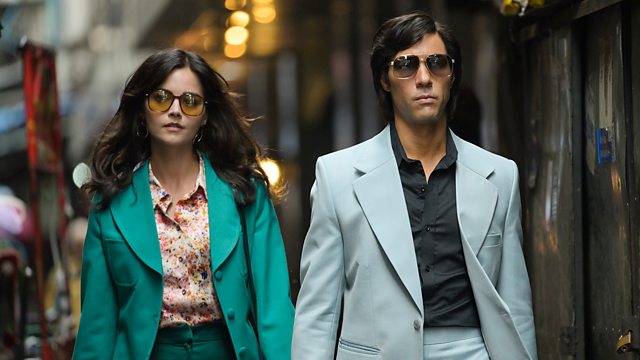
It seems as though there has never been a stronger appetite for dramatisations of true crime. The fascination with serial killers has long been there, but in the last few years, the quality and the focus of dramatic retellings of same has definitely shifted; with The Serpent, we get a cleverly-constructed and very engaging series all about a serial murderer whom I never before knew existed.
We begin in 1970s Bangkok, a city at the heart of what came to be known as the ‘hippie trail’. This was a generation that wished to do things very differently to their parents’ generation. Keen to travel as far afield as possible, young people routinely made their way through Europe to Asia, often stopping at Bangkok, which became a hub for this kind of alternative tourism. Young, often inexperienced and naïve, travelling far from home when only the postal service and landline telephones connected them to their loved ones, they were ripe for exploitation. ‘Alain Gautier’, a slightly older man, offered shelter, drinks and company to these travellers which they often gladly took. Money was always tight, and he and his wife Monique seemed friendly and considerate. All good, except the audience is already privy to Alain’s modus operandi: drugging them, robbing them and stealing their identities by tampering with their passports. Very early in the series, we see identity being presented as something wholly mutable, easy to change, steal and discard. Right down to names themselves, which come and go as required.
And speaking of which, this is not in fact the story of Alain Gautier and his wife. It is the story of serial murderer Charles Sobhraj and his accomplice Marie-Andrée Leclerc, a pair of confidence tricksters and thieves who added to their coffers by disposing of the Western tourists whom they gulled along the way. Sobhraj is believed to have killed between twelve and twenty-four people in the 60s and 70s; because these people were by nature wanderers, and because Sobhraj was a plausible, personable man who looked the part, he got away with his crimes for decades before being convicted in India and in Nepal and given a life sentence in each. (He returned to Paris in-between times and basked in the infamy he had developed; perhaps Sobhraj was one of the first serial killers to really understand their celebrity, but like many celebrities, he then developed a sense of his own untouchability which really came back to bite him. The exploration of this in the series is nicely done.)
The series does an excellent job of building a sense of a transient, idealistic but vulnerable travelling population, with no real handle on where they are or how things work there. It also makes it clear that Gautier (who also moonlights as a gem salesman, thus duping people on a whole different wealth level) is an expert manipulator, well-placed in terms of having a spacious apartment, good local knowledge, and thanks to a relationship with a local Thai girl, a friendly face at the local police. However, this seemingly untouchable status is very steadily eroded by the introduction of other characters. When a young Dutch couple go missing (in a series of scenes which are cumulatively genuinely upsetting) this attracts the attention of a Dutch diplomat, Herman Knippenberg, who begins to investigate. Little by little, this leads him closer to Gautier, Gautier’s faithful assistant Ajay and Monique, but given these three are very clearly guided by Alain’s knowledge and guile, and – given Knippenberg is not being employed as a detective – the process is often agonising. Always on the move, Gautier and his entourage flit from place to place using the various passports at their disposal. Using stock footage of some of the cities involved which melds impeccably into the series itself is a clever move, and the clothes, music, sociolect and other details are meticulously realised. The almost-continual smoking of cigarettes begins to feel a little OTT in places, but give a filmmaker legitimate excuse to showcase a habit which is now considered too hot for TV and my word, will they run with it.

The episodes are very carefully constructed, pieced together out of a series of different timelines which do not move in a linear fashion – anyone who struggles with this kind of structure needs to be aware that the series jumps around, sometimes within single days, but sometimes over a period of several years. For the most part, at least in the earlier episodes, a moment glimpsed in one light will later be re-played from a new perspective, or else we catch up to that moment having been elsewhere first, which brings to bear new information on a previously-seen moment. When in other films or series this is done poorly, it feels like filler; here, it does add depth to the story and it also offers context for characters, such as Monique, who might otherwise seem like little more than two-dimensional players. And, as the series runs over eight episodes, it doesn’t need to simply prioritise the main characters. It also takes ample time to humanise Gautier’s victims; each of these people gets a back story, each of them is turned into a character in their own right which then suffers horribly. It’s deeply uncomfortable, but it is part of the avowed motivation of Ripper Street writers Toby Finlay and Richard Warlow and director Tom Shankland to commemorate those that died – an uncomfortably large number of people, here made into more than a statistic with a degree of detail which I can’t recall seeing anywhere else. This really does mark The Serpent out as not simply humanising the villains of the piece and their pursuants, which other series have done phenomenally well, though perhaps at the expense of the victims themselves.
Even so, it is still not as simple as all that. Jenna Coleman (who learned French for the role) is far more than simply some femme fatale figure: her own story makes clear why she thought a relationship with this man was a good antidote to a humdrum life in Quebec. Steadily, it becomes clear that she was, in effect, groomed to play a part; it’s a part she grows increasingly disenchanted with and Coleman strikes a great balance between Monique’s complicity and Marie-Andrée’s quietly-building rebellion. She is sympathetic, in a way which Tahar Rahim isn’t – but his own back story is an interesting one. The series paints a picture of what happens when the free-and-easy milieu of the day accidentally enables a psychopath, and carefully reveals the limits of his power. Oh-so steadily his decision-making processes erode and Rahim does a superb job revealing the extent of the man’s narcissism – which is again, borne out by the facts in the case.
Something else which the series does remarkably well – after the case on which it is based – is display the teeth-grating inefficiency of bureaucracy. The series is rife with it: missed opportunities, a lack of joined-up policy, prioritisation being given to all the wrong things, clueless officials. The sheer frustration at how the case existed for years longer than it needed is amply provided; you can sense the dismay of the series-makers at this, and it’s contagious. It also, perhaps accidentally, gives us parallels to the current day where inefficient practice and endless paper-trails still exist, in a world which may be ostensibly ‘paper free’ and interconnected, but still suffers from the same issues because it’s still run by people with their own agendas and personal weaknesses. Again, because the series has an ample run time, the great powerlessness which Knippenberg feels as he tries to juggle his own career in the bureaucracy is able to really flourish. The eventual pay-off of this series, with its links to the real life story, gives an impression of a remarkable group of people in an extraordinary set of circumstances.
I’m not known for my great enjoyment of BBC dramas – just a year ago I was railing against one – but I was pleasantly surprised by The Serpent, a series which metes out the details of a horrendous real-life story in a way which is gripping, but never glorifying. Every mean-spirited trait is balanced against a positive one in a way which offers complex characters and a well-turned story. It’s an aesthetic and aural treat along the way, too.
